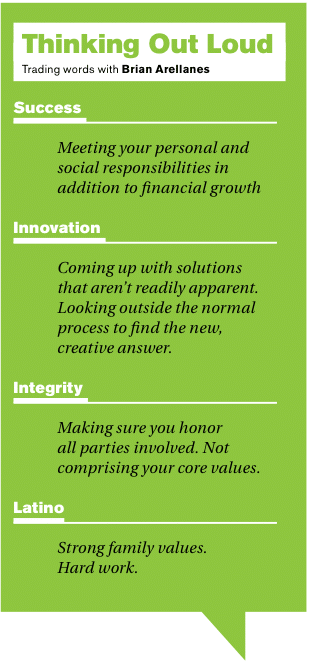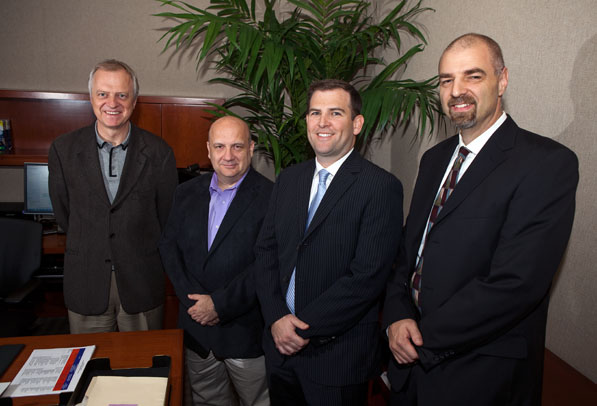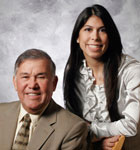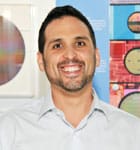 As the son of a single mother in blue-collar Benicia, California, some thought Brian Arellanes’s story was already written for him. And indeed, there were aspects of it that seemed to confirm assumptions based on his Mexican heritage. His mom, reliant on child support in addition to her job as a property manager, struggled to provide for her children. But she always managed to keep a roof over their heads and food in their mouths. “We didn’t always have the nicest clothes, but it was more than a lot of people had,” Arellanes recalls.
As the son of a single mother in blue-collar Benicia, California, some thought Brian Arellanes’s story was already written for him. And indeed, there were aspects of it that seemed to confirm assumptions based on his Mexican heritage. His mom, reliant on child support in addition to her job as a property manager, struggled to provide for her children. But she always managed to keep a roof over their heads and food in their mouths. “We didn’t always have the nicest clothes, but it was more than a lot of people had,” Arellanes recalls.
When he was in eighth grade, Arellanes went to live with his father, an Oakland firefighter with an old-school mentality that emphasized hard work. “He didn’t believe in getting something for nothing,” Arellanes says. He went to work at a gas station in his new, affluent, mostly Caucasian community when he was 14. Although it wasn’t an everyday occurrence, he does remember being the brunt of subtle stereotyping—and sometimes not-so subtle. “I was called out as the only Mexican,” Arellanes explains. “I remember one time in particular, they put me as ‘most likely to work at McDonald’s.’ I look back and laugh about it now, but I was pretty upset about it at the time. You don’t ever want to be thrown into that category.”
The jab stayed fresh in his mind throughout high school. He would look around the parking lot and see his classmates’ brand new cars. Then his eyes would fall on his old, dented clunker. “We just came from very different situations,” he says. “To be honest, I almost didn’t go to college. I just wanted to get out of there and start life.”

At the time, Arellanes dreamed of opening a mechanic shop in the future, but his grandfather talked him into taking a couple of classes at a local college to learn how to run the potential business. From then on, he was hooked. After college, Arellanes started working as a recruiter before moving on to sales and a series of leadership positions. But after making millions for others and becoming disillusioned with their lack of interest in charity, he started his own business in 2006: ITSource Technology, a tactical group dedicated to helping companies stay ahead of the digital curve.
He now counts the BD Biosciences, the US Postal Service, Wells Fargo, and Hewlett Packard among his clients, but his real joy lies in the relationships he’s built, not the profits he has made (although there has been plenty of that). For example, at the surface level, ITSource partners with BD Biosciences, a Fortune 500 industry leader, to develop flagship products including medical devices and the software that accompanies them. But moreso than a business partnership, they share a commitment to support Hispanic businesses and hire and promote Hispanics into executive leadership roles, says Arellanes. This is not just a goal but a reality at ITSource, whose diverse executive team includes Hispanic, African-American, and Asian members.
In addition to being certified a Minority-owned Business Enterprise, ITSource Technology is ranked in the top 500 largest Hispanic businesses in America. As such, ITSource beat out competitors to become a global consulting partner of HP, which has a strong commitment to utilizing Hispanic and other minority vendors. For one particular project, the companies partnered to successfully use one of ITSource’s California-based Tier-I Help Desk teams in an outsourcing model to help create local jobs in addition to building local software-development and IT security teams for a digital-document management solution.
One of his company’s biggest accomplishments? Developing a business model to solve critical issues by optimizing clients’ operations and strategies, which has made the company a go-to partner of multimillion-dollar projects. In a time when government entities and the private sector are both struggling, ITSource Technology’s formula—as well as its personal touch—has made it invaluable. “A lot of companies are so focused on the sale that they have a ‘turn ‘em and burn ‘em’ attitude, and we don’t focus on that at all,” Arellanes says. “It’s about following the ethical path and knowing that you worked with honor and integrity.”As Arellanes knows all too well, the road is not always easy, but he certainly has come a long way. “You have to stay persistent. I’ve been knocked down quite a few times, and it’s always about getting up,” he says.

